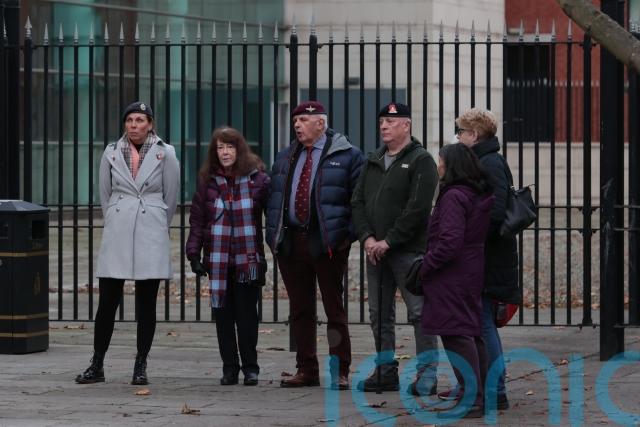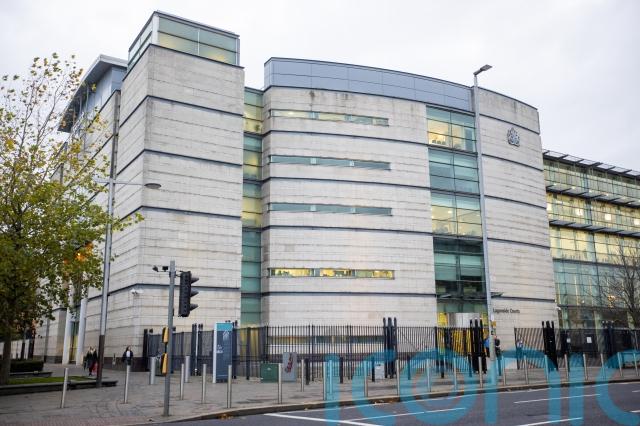
A former paratrooper known as Soldier F has been found not guilty of committing two murders and five attempted murders on Bloody Sunday in Londonderry in 1972.
Delivering his judgment at Belfast Crown Court, Judge Patrick Lynch said the evidence presented against the veteran fell “well short” of what was required for conviction.
However, the judge said that members of the Parachute Regiment had shot dead unarmed civilians, and those involved should “hang their heads in shame”.
The UK Government has said it is committed to “finding a way forward that acknowledges the past” in Northern Ireland following the verdicts.
In the packed public gallery at court 12, gathered relatives of the Bloody Sunday victims gave no visible response as the veteran was found not guilty on all counts.
There was also no reaction from those in the public gallery supporting the former paratrooper.
Soldier F had been accused of the murders of James Wray and William McKinney on Bloody Sunday, regarded as one of the darkest days of the Troubles in Northern Ireland.
The veteran had also been accused of attempting to murder Michael Quinn, Patrick O’Donnell, Joseph Friel, Joe Mahon and an unknown person.
Thirteen people were killed when members of the Parachute Regiment opened fire on a civil rights demonstration in the city.
The non-jury trial heard evidence across four weeks which included statements by two of Soldier F’s colleagues.
Soldier F was present at Belfast Crown Court for each day of the trial with his identify concealed behind a curtain in the court room.
Relatives of the men killed and supporters also attended each day of the trial.
Delivering his judgment, Judge Lynch said on Bloody Sunday a number of members of the Parachute Regiment entered Glenfada Park North in Derry and started firing at unarmed civilians at a distance of 50 metres or less.
He said this resulted in two murders and a number of people being unlawfully wounded.

The judge said: “They had totally lost all sense of military discipline. They were members of a regiment formed in 1942 at the behest of prime minister Churchill and had a proud record in World War Two.”
He added: “Those who fought valiantly against SS Panzer divisions in 1944 have had their regiment sullied by some of their successors.
“Shooting in the back unarmed civilians fleeing from them on the streets of a British city.
“Those responsible should hang their heads in shame.”
However, the judge said there was no concept of “collective guilt” in the courts.
He said the Crown had failed to establish that Soldier F was “knowingly and intentionally assisting in the shootings, with intent to kill, or was shooting himself with that intention”.

He said the sole evidence against Soldier F was from two other veterans, Soldiers G and H, and said there were difficulties in relying on it.
The judge said: “Their statements, the sole and decisive evidence, cannot be tested in a way that witnesses giving evidence from the witness box would be.
“Delay has, in my view, seriously hampered the capacity of the defence to test the veracity and accuracy of the hearsay statements.
“The two witnesses are themselves, on the basis of the Crown case guilty of murder as, in essence, accomplices with a motivation to name F as a participant in their murderous activities.
“I find that they have been serially untruthful about matters central to events giving rise to this prosecution.”
The judge added that “whatever suspicion” the court may have about the role of Soldier F, he was “constrained and limited” by the evidence presented.
He said: “To convict it has to be upon evidence that is convincing and manifestly reliable.
“The evidence presented by the Crown falls well short of this standard and signally fails to reach the high standard of proof required in a criminal case; that of proof beyond a reasonable doubt.
“Therefore, I find the accused not guilty on all seven counts on the present bill of indictment.”
A Government spokesperson said it noted the judgment.
The spokesperson added: “The MoD (Ministry of Defence) has provided legal and welfare support throughout, as it does for any veteran involved in a legal process arising from their duties.
“This case is part of the complex legacy of the Troubles, which affected so many families and communities.
“We are committed to finding a way forward that acknowledges the past, whilst supporting those who served their country during an incredibly difficult period in Northern Ireland’s history.”
Conservative leader Kemi Badenoch said she was “pleased” at the verdict.
She told broadcasters: “I know that there have been people on both sides who felt a lot of pain, but this verdict should draw a line on what has been a very difficult issue.”
The continued denial of justice for the Bloody Sunday families is deeply disappointing.
Fifty three years ago, the British Army indiscriminately murdered civilians on the streets of Derry.
Over fifteen years ago, the then British Prime Minister publicly acknowledged the role… pic.twitter.com/j1t5gE79M7
— Michelle O’Neill (@moneillsf) October 23, 2025
Northern Ireland’s Public Prosecution Service also acknowledged the verdict.
In a statement, Director of Public Prosecutions Stephen Herron described “complex legal and evidential issues”.
“The challenges of prosecuting legacy cases are well documented,” he said.
“From the outset, this case presented complex legal and evidential issues, including the admissibility and reliability of statements taken from soldiers by the Royal Military Police at the time.”
He added: “Our thoughts today are foremost with the Wray and McKinney families, those who were wounded, and the loved ones of all killed and injured on Bloody Sunday. We understand that today’s outcome comes after a prolonged and painful process for those families.
“We can assure the public that all decision-making in this case was conducted independently and impartially and fully in accordance with our Code for Prosecutors.”
Meanwhile, First Minister Michelle O’Neill said she will continue to support the Bloody Sunday families in the “pursuit of justice”.
In a social media post, Ms O’Neill said the “continued denial of justice for the Bloody Sunday families is deeply disappointing”.
She added: “Fifty three years ago, the British Army indiscriminately murdered civilians on the streets of Derry.
“Over 15 years ago, the then British prime minister publicly acknowledged the role of British soldiers on Bloody Sunday.
“Yet, not one British soldier or their military and political superiors has ever been held to account.
“That is an affront to justice.”

DUP leader Gavin Robinson has said the majority of those in the armed forces who served in Northern Ireland during the Troubles did so with “honour”.
He said: “This was a detailed verdict from the judge which will obviously need to be studied in detail, but it represents a clear and welcome outcome.
“This has been an extremely lengthy process, however, and will have reopened many painful memories.
“The events of January 30 1972 have been scrutinised and pored over more than any other single event in our history.”
Subscribe or register today to discover more from DonegalLive.ie
Buy the e-paper of the Donegal Democrat, Donegal People's Press, Donegal Post and Inish Times here for instant access to Donegal's premier news titles.
Keep up with the latest news from Donegal with our daily newsletter featuring the most important stories of the day delivered to your inbox every evening at 5pm.